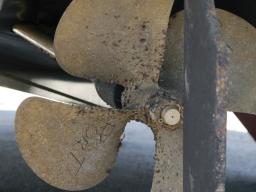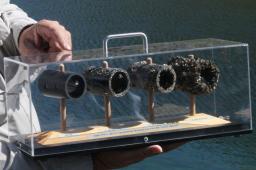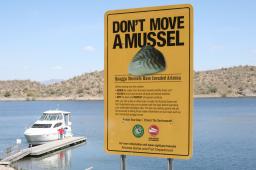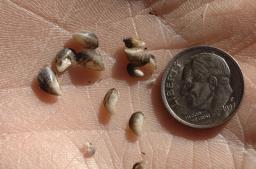- Slug: BC-CNS-Quagga-Law,495
- With: BC-CNS-Quagga-Law-Box
- File photos available (thumbnails, captions below)
By TRAVIS GRABOW
Cronkite News Service
PHOENIX (Monday, Oct. 5) _ Boat owners can face fines if they don’t properly decontaminate craft removed from waters infested with aquatic invasive species thanks to a new law prompted by the quagga mussel’s spread.
“There’s only so many times you can tell people in the water to clean, drain and dry their boat,” said Tom McMahon, invasive species coordinator for the Arizona Game and Fish Department.
The law, authored by Rep. Nancy McLain, R-Bullhead City, gives Game and Fish authority to set up checkpoints and direct those found to be carrying prohibited species to either decontaminate boats or face fines of up to $500. It took effect Sept. 30.
While the law applies to aquatic invasive species in general, McLain, McMahon and others said the main goal for now is curbing the spread of the destructive quagga mussel.
“The implications of moving these things around are severe,” said Kevin Bergersen, boating law administrator for Game and Fish.
The quagga has infested lakes Mead, Mohave and Havasu along the Colorado River, the Central Arizona Project aqueduct and Lake Pleasant north of Phoenix.
Along with its cousin the zebra mussel, the quagga has caused extensive damage to infrastructure and ecosystems in the Great Lakes region. The mussels breed rapidly and form large colonies that can block intake valves and pipes.
The environmental damage can be significant as well. The mussels filter large amounts of phytoplankton from the water, disrupting the bottom of the food chain.
While the law allows Game and Fish to use money from the state’s Watercraft Licensing Fund for enforcement, Bergersen said the state’s budget troubles make it uncertain how much money the department can commit to fighting invasive species.
McLain said the law will help even if all it does for now is raise awareness.
“I still think there’s some value to do it,” she said. “The quagga mussels are established along the river here, but the hope is that when the next potential invasive species problem comes along we’ll have something in place to perhaps thwart it so it won’t become a problem like the quaggas are now.”
Sandy Bahr, conservation outreach director for the Sierra Club’s Grand Canyon Chapter, said the law is a step in the right direction if it can be applied properly.
“Every regulation, every protection, is only as effective as the enforcement mechanism and the education mechanism,” she said. “I think its effectiveness will depend to a great degree on how effective they are at educating people who are boaters and enforcing the regulations.”
Up to this point, Game and Fish has focused on awareness campaigns such as the “Don’t Move a Mussel,” in which the department placed signs next to boat launches, advertised on billboards and created public service announcements.
Bergersen said both enforcement and education are key to limiting the spread of invasive species.
“We want to make sure that the public knows that if they have mussels on their boat they’re gonna be detained until they clean it,” he said.
^___=
Web Links:
_ Arizona Game and Fish Department: www.azgfd.gov
^___=
PHOTOS: Click thumbnails to see full-resolution images.
QUAGGA-LAW

A boat removed from Lake Pleasant has quagga mussels on its propeller.
Quagga mussels are shown in this undated photo by the Arizona Game and
Fish Department. With the destructive invasive species established
along the Colorado River, in the Central Arizona Project, in Lake
Pleasant and at the entrance to canals stretching through Phoenix, a
new law establishes penalties for failing to properly clean boats that
have been in infested waterways. (Cronkite News Service Photo by Andrea
Wilson)

This exhibit by the Arizona Game and Fish Department illustrates how
quagga mussels can clog pipes. With the destructive invasive species
established along the Colorado River, in the Central Arizona Project,
in Lake Pleasant and at the entrance to canals stretching through
Phoenix, a new law establishes penalties for failing to properly clean
boats that have been in infested waterways. (Cronkite News Service
Photo by Andrea Wilson)

A sign at Lake Pleasant urges boaters to take precautions to avoid
transporting destructive quagga mussels. With the destructive invasive
species established along the Colorado River, in the Central Arizona
Project, in Lake Pleasant and at the entrance to canals stretching
through Phoenix, a new law establishes penalties for failing to
properly clean boats that have been in infested waterways. (Cronkite
News Service Photo by Andrea Wilson)

Quagga mussels are shown in this undated photo by the Arizona Game and
Fish Department. With the destructive invasive species established
along the Colorado River, in the Central Arizona Project, in Lake
Pleasant and at the entrance to canals stretching through Phoenix, a
new law establishes penalties for failing to properly clean boats that
have been in infested waterways. (Arizona Game and Fish
Department/George Andrejko via Cronkite News Service)